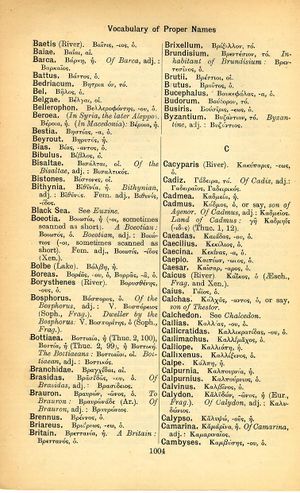Byzantium: Difference between revisions
ῥεῖα δ' ἀρίζηλον μινύθει καὶ ἄδηλον ἀέξει, ῥεῖα δέ τ' ἰθύνει σκολιὸν καὶ ἀγήνορα κάρφει → easily he humbles the proud and raises the obscure, and easily he straightens the crooked and blasts the proud (Hesiod, Works and Days 6-8)
(Gf-D_2) |
(3_2) |
||
| Line 10: | Line 10: | ||
{{Gaffiot | {{Gaffiot | ||
|gf=<b>Byzantĭum</b>¹² (<b>-tĭŏn</b>), ĭī, n. (Βυζάντιον), Byzance [postérieurement Constantinople, ville sur le Bosphore de Thrace] : Cic. Sest. 56 ; Domo 52 ; Liv. 38, 16, 3 || <b>-tĭăcus</b> Stat. S. 4, 9, 13 ; <b>-tīnus</b> Tert. Scap. 3 ; <b>-tĭus</b>, a, um Cic. Domo 129 ; Hor. S. 2, 4, 66, de Byzance, byzantin || <b>Byzantĭī</b>, ōrum, m., habitants de Byzance : Cic. Verr. 2, 2, 76.||<b>-tĭăcus</b> Stat. S. 4, 9, 13 ; <b>-tīnus</b> Tert. Scap. 3 ; <b>-tĭus</b>, a, um Cic. Domo 129 ; Hor. S. 2, 4, 66, de Byzance, byzantin||<b>Byzantĭī</b>, ōrum, m., habitants de Byzance : Cic. Verr. 2, 2, 76. | |gf=<b>Byzantĭum</b>¹² (<b>-tĭŏn</b>), ĭī, n. (Βυζάντιον), Byzance [postérieurement Constantinople, ville sur le Bosphore de Thrace] : Cic. Sest. 56 ; Domo 52 ; Liv. 38, 16, 3 || <b>-tĭăcus</b> Stat. S. 4, 9, 13 ; <b>-tīnus</b> Tert. Scap. 3 ; <b>-tĭus</b>, a, um Cic. Domo 129 ; Hor. S. 2, 4, 66, de Byzance, byzantin || <b>Byzantĭī</b>, ōrum, m., habitants de Byzance : Cic. Verr. 2, 2, 76.||<b>-tĭăcus</b> Stat. S. 4, 9, 13 ; <b>-tīnus</b> Tert. Scap. 3 ; <b>-tĭus</b>, a, um Cic. Domo 129 ; Hor. S. 2, 4, 66, de Byzance, byzantin||<b>Byzantĭī</b>, ōrum, m., habitants de Byzance : Cic. Verr. 2, 2, 76. | ||
}} | |||
{{Georges | |||
|georg=Bȳzantium, ī, n. ([[Βυζάντιον]]), Byzanz, das heutige Konstantinopel, Nep. Paus. 2, 2 sq. Liv. 38, 19, 3 sqq. – Die griech. [[Form]] Byzantion, Lucan. 9, 958. – Dav.: A) Bȳzantīnus, a, um, byzantinisch, [[Auson]]. u. [[Sidon]].: [[proceres]], Claud. in Eutr. 2, 136. – Plur. subst., Bȳzantīnī, ōrum, m., die Einw. [[von]] Byzanz, die Byzantiner, Treb. Poll. Claud. 9, 7. – B) Bȳzantius, a, um ([[Βυζάντιος]]), byzantisch, exsules, Cic.: [[muria]], Hor.: litora, die [[Straße]] [[von]] Konstantinopel, Ov.: [[portus]], Plin. – Plur. subst., Bȳzantiī, ōrum, m., die Einw. [[von]] Byzanz, die Byzantier, Cic. u.a. – C) Bȳzantiacus, a, um (Βυζαντιακός), byzantisch, Stat. silv. 4, 9, 13. | |||
}} | }} | ||
Revision as of 08:40, 15 August 2017
English > Greek (Woodhouse)
Βυζάντιον, τό.
Byzantine, adj.: Βυζάντιος.
Latin > English (Lewis & Short)
Bȳzantĭum: ii, n., = Βυζάντιον,
I a city in Thrace, on the Bosphorus, opposite the Asiatic Chalcedon, later Constantinopolis, now Constantinople; among the Turks, Istamboul or Stamboul (i.e. εις τὴν πόλιν), Mel. 2, 2, 6; Plin. 4, 11, 18, § 46; 9, 15, 20, § 50 sq.; Nep. Paus. 2, 2; Liv. 38, 16, 3 sq.; Tac. A. 12, 63 sq.; id. H. 2. 83; 3, 47 al.—
II Derivv.
A Bȳzantĭus, a, um, adj., of Byzantium, Byzantine: litora, the Strait of Constantinople, Ov. Tr. 1, 10, 31: portus, Plin. 9, 15, 20, § 51.—Subst.: Bȳ-zantĭi, ōrum, m., the inhabitants of Byzantium, Cic. Prov. Cons. 3, 5; 4, 6 sq.; id. Verr. 2, 2, 31, § 76; Nep. Timoth. 1, 2; Liv. 32, 33, 7.—
B Bȳzantĭăcus, a, um, adj., of Byzantium: lacerti, Stat. S. 4, 9, 13. —
C Bȳzantīnus, a, um, adj., the same (post-class.): Lygos, Aus. Clar. Urb. 2: frigora, Sid. Ep. 7, 17.
Latin > French (Gaffiot 2016)
Byzantĭum¹² (-tĭŏn), ĭī, n. (Βυζάντιον), Byzance [postérieurement Constantinople, ville sur le Bosphore de Thrace] : Cic. Sest. 56 ; Domo 52 ; Liv. 38, 16, 3 || -tĭăcus Stat. S. 4, 9, 13 ; -tīnus Tert. Scap. 3 ; -tĭus, a, um Cic. Domo 129 ; Hor. S. 2, 4, 66, de Byzance, byzantin || Byzantĭī, ōrum, m., habitants de Byzance : Cic. Verr. 2, 2, 76.
Latin > German (Georges)
Bȳzantium, ī, n. (Βυζάντιον), Byzanz, das heutige Konstantinopel, Nep. Paus. 2, 2 sq. Liv. 38, 19, 3 sqq. – Die griech. Form Byzantion, Lucan. 9, 958. – Dav.: A) Bȳzantīnus, a, um, byzantinisch, Auson. u. Sidon.: proceres, Claud. in Eutr. 2, 136. – Plur. subst., Bȳzantīnī, ōrum, m., die Einw. von Byzanz, die Byzantiner, Treb. Poll. Claud. 9, 7. – B) Bȳzantius, a, um (Βυζάντιος), byzantisch, exsules, Cic.: muria, Hor.: litora, die Straße von Konstantinopel, Ov.: portus, Plin. – Plur. subst., Bȳzantiī, ōrum, m., die Einw. von Byzanz, die Byzantier, Cic. u.a. – C) Bȳzantiacus, a, um (Βυζαντιακός), byzantisch, Stat. silv. 4, 9, 13.

